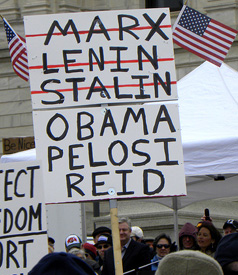
|  |  |  Opinions | Issues Opinions | Issues  
Nine Myths About Socialism in the US
 Bill Quigley - t r u t h o u t Bill Quigley - t r u t h o u t
go to original
April 12, 2010


| | (Fibonacci Blue) |  |
Glenn Beck and other far right multi-millionaires are claiming that the US is hot on the path toward socialism. Part of their claim is that the US is much more generous and supportive of our working and poor people than other countries. People may wish it was so, but it is not.

As Sen. Patrick Moynihan used to say "Everyone is entitled to their own opinions. But everyone is not entitled to their own facts."

The fact is that the US is not really all that generous to our working and poor people compared to other countries.

Consider the US in comparison to the rest of the 30 countries that join the US in making up the OECD - the Organization for Economic Cooperation and Development. These 30 countries include Canada and most comparable European countries, but also include some struggling countries like Czech Republic, Greece, Hungary, Korea, Mexico, Poland, Slovak Republic and Turkey.

When you look at how the US compares to these 30 countries, the hot air myths about the US government going all out toward socialism sort of disappear into thin air. Here are some examples of myths that do not hold up.

Myth No. 1: The US Government Is Involved in Class Warfare, Attacking the Rich to Lift Up the Poor.

There is a class war going on all right. But it is the rich against the rest of us and the rich are winning. The gap between the rich and everyone else is wider in the US than any of the 30 other countries surveyed. In fact, the top 10 percent in the US have a higher annual income than any other country. And the poorest 10 percent in the US are below the average of the other OECD countries. The rich in the US have been rapidly leaving the middle class and poor behind since the 1980s.

Myth No. 2: The US Already Has the Greatest Health Care System in the World.

Infant mortality in the US is fourth worst among OECD countries - better only than Mexico, Turkey and the Slovak Republic.

Myth No. 3: There Is Less Poverty in the US Than Anywhere.

Child poverty in the US, at over 20 percent or one out of every five kids, is double the average of the 30 OECD countries.

Myth No. 4: The US Is Generous in Its Treatment of Families With Children.

The US ranks in the bottom half of countries in terms of financial benefits for families with children. Over half of the 30 OECD countries pay families with children cash benefits regardless of the income of the family. Some among those countries (e.g. Austria, France and Germany) pay additional benefits if the family is low income or one of the parents is unemployed.

Myth No. 5: The US Is Very Supportive of Its Workers.

The US gives no paid leave for working mothers having children. Every single one of the other 30 OECD countries has some form of paid leave. The US ranks dead last in this. Over two-thirds of the countries give some form of paid paternity leave. The US also gives no paid leave for fathers.

In fact, it is only workers in the US who have no guaranteed days of paid leave at all. Korea is the next lowest to the US and it has a minimum of eight paid annual days of leave. Most of the other 30 countries require a minimum of 20 days of annual paid leave for their workers.

Myth No. 6: Poor People Have More Chance of Becoming Rich in the US Than Anywhere Else.

Social mobility (how children move up or down the economic ladder in comparison with their parents) in earnings, wages and education tends to be easier in Australia, Canada and Nordic countries like Denmark, Norway and Finland, than in the US. That means more of the rich stay rich and more of the poor stay poor here in the US.

Myth No. 7: The US Spends Generously on Public Education.

In terms of spending for public education, the US is just about average among the 30 countries of the OECD. Educational achievement of US children, however, is seventh worst in the OECD. On public spending for childcare and early education, the US is in the bottom third.

Myth No. 8: The US Government Is Redistributing Income From the Rich to the Poor.

There is little redistribution of income by government in the US in part because spending on social benefits like unemployment and family benefits is so low. Of the 30 countries in the OECD, only in Korea is the impact of governmental spending lower.

Myth No. 9: The US Generously Gives Foreign Aid to Countries Across the World.

The US gives the smallest percentage of aid of any of the developed countries in the OECD. In 2007, the US was tied for last with Greece. In 2008, we were tied for last with Japan.

Despite the opinions of right-wing folks, the facts say the US is not on the path toward socialism.

But if socialism means the US would go down the path of being more generous with our babies, our children, our working families, our pregnant mothers and our sisters and brothers across the world, I think we could all appreciate it

Bill Quigley is legal director at the Center for Constitutional Rights and a law professor at Loyola University New Orleans. He is a Katrina survivor and has been active in human rights in Haiti for years with the Institute for Justice and Democracy in Haiti. He can be reached at quigley77(at)gmail.com. |

 |
|  |



